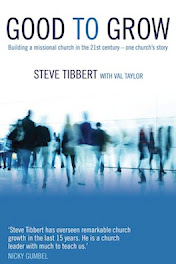When I moved to lead Kings 15 years ago I thought that the church was already diverse. 10 to 15% of those attending came from the black community, but everything else about the church was white – the way we did everything and all the leadership. We had around 40 extended leaders which included just 2 or 3 black people, predominantly Caribbean, first and second generation.
While we were aware of the issue, in the first few years we had enough to keep our attention elsewhere – including a major building project. It wasn’t until we moved back into our new building that the first black African couple arrived, causing great excitement! Today, there appears no outright majority in our church.
We are on a massive journey. I may view things differently in three months time - we think we see things clearly and then as time goes on and situations open up even more, we have to change. We are learning all the time – I’m aware that most of our Newfrontiers churches are white but seeing increased diversity in those attending, so churches want to learn about this vital issue. If all we do is get excited about diversity, we miss the point. There are radical implications for how we lead our churches.
Let’s talk about something really basic first. Food! In the early days Deb and I invited an African couple for a meal. We asked if there was anything they didn’t eat - they said they ate anything but when we served strawberries, it was clear that the husband had never tasted one before. We all laugh now, but were all embarrassed at the time. We didn’t see - Food is an issue. When we began Alpha at church and were providing food there, we served white western (bland) food! We were trying to reach out to local people with the gospel and were giving them a hurdle to overcome by providing food they found difficult. I used to sit at an Alpha table in a diverse group and I would be the only one eating the food. ‘It’s alright – we ate before we came…’ they would say – it took me about three Alphas to work that one out!
Then, we got to know a family through the school our boys attend, and the Mum came along to one of our prayer meetings. I was very aware that she came from a different church background – a black majority church. We were doing our usual prayer meeting (which we thought was liberated!) and when I asked her how she was finding the evening, she said, ‘I’ve never attended a white majority church before’. I was stunned. I thought we were diverse! I wanted to say to her, ‘Look! There’s a black person, and there’s an Asian - and they aren’t sitting at the back!’ (I’d been to other churches and observed where people sat…) And then the penny dropped. I was looking from a white western perspective.
Charismatic Gifts in Church History
3 weeks ago

.JPG)





